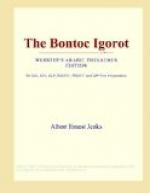Throughout the Bontoc culture area Lu-ma’-wig is the one and only god of the people. Many said that he lived in Bontoc, and, so far as known, they hold the main facts of the belief in him substantially as do the people of his own pueblo.
“Changers” in religion
In the western pueblos of Alap, Balili, Genugan, Takong, and Sagada there has been spreading for the past two years a changing faith. The people allying themselves with the new faith call themselves “Su-pa-la’-do,” and those who speak Spanish say they are “guardia de honor.”
The Su-pa-la’-do continue to eat meat, but wash and cleanse it thoroughly before cooking. They are said also not to hold any of the ceremonials associated with the old faith. They keep a white flag flying from a pole near their dwelling, or at least one such flag in the section of the pueblo in which they reside. They also believe that Lu-ma’-wig will return to them in the near future.
A Tinguian man of the pueblo of Pay-yao’, Lepanto, a short journey from Agawa, in Bontoc, is said to be the leading spirit in this faith of the “guardia de honor.” It is believed to be a movement taking its rise from the restless Roman Catholic Ilokano of the coast.
In Bontoc pueblo the thought of the return of Lu-ma’-wig is laughed at. The people say that if Lu-ma’-wig was to return they would know of it. However, two families in Bontoc, one that of Finumti, the tattooer, and the other that of Kayyad, a neighbor of Finumti, have a touch of a changing faith. They are known in Bontoc as O-lot’.
I was not able to trace any connection between the O-lot’ and the Su-pa-la’-do, though I presume there is some connection; but I learned of the O-lot’ only during the last few days of my stay in Bontoc. The O-lot’ are said not to eat meat, not to kill chickens, not to smoke, and not to perform any of the old ceremonies. However, I do not believe they or in fact the Su-pa-la’-do neglect all ceremonials, because such a turning from a direct, positive, and very active religious life to one of total neglect of the old religious ceremonials would seem to be impossible for an otherwise normal Igorot.
Priesthood
That the belief in spirits is the basis of Igorot religion is shown in the fact that each person or each household has the necessary power and knowledge to intercede with the anito. No class of persons has been differentiated for this function, excepting the limited one of the dream-appointed insupak or anito exorcists.
That belief in a supreme being is a later development than the belief in spirits is clear when the fact is known that a differentiated class of persons has arisen whose duty it is to intercede with Lumawig for the people as a whole.




